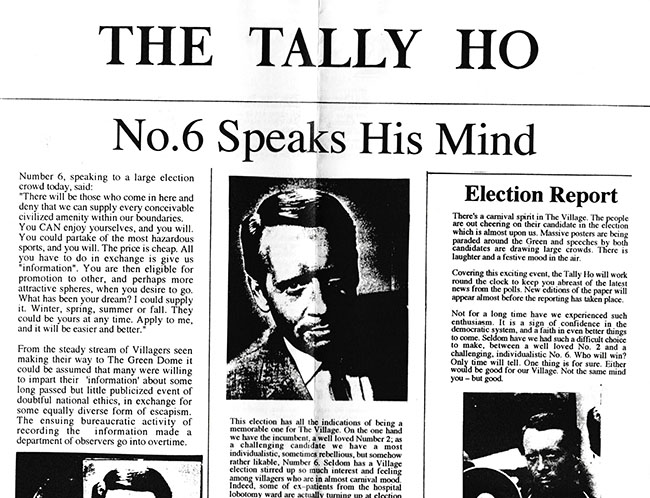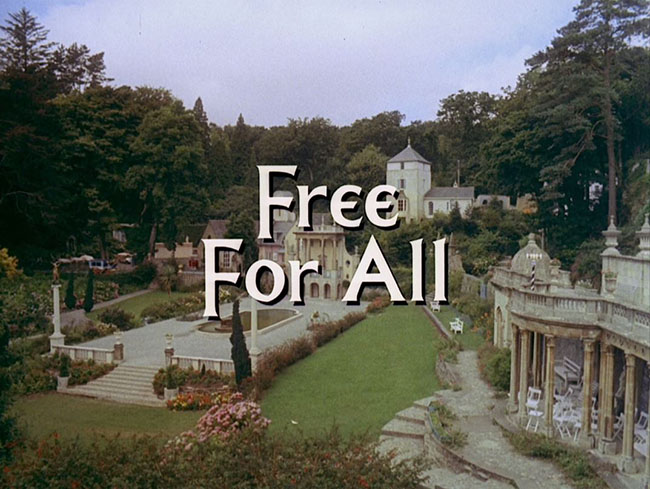FREE FOR ALL First UK Broadcast: October 20, 1967 [episode #4 in transmission order] | Written by Paddy Fitz (Patrick McGoohan) | Directed by Patrick McGoohan
SYNOPSIS
No.2 (Eric Portman, A Canterbury Tale) is an incumbent without rivals in the Village’s annual election. He encourages No.6 to run against him, and 6 eventually agrees, reluctantly accepting as his assistant his latest maid, No.58 (Rachel Herbert, Robbery), who doesn’t speak a word of English. But after his initial campaign speech, in which he promises to find out “who are the prisoners and who are the warders,” he’s taken to the Village Council which questions his motives and is submitted to a brainwasher who turns him into a tool of the Village. No.6 immediately becomes the ideal Village candidate, barking authoritarian sloganeering into a megaphone. But he also begins acting more erratically, with bursts of violence. In a moment of clarity he attempts to escape via boat, but he’s subdued by Rover. Dissatisfied with the non-alcoholic liquor available at the local establishment, he joins No.2 at a speakeasy in a cave, which No.2 calls the “therapy zone.” No.2 then drugs No.6. No.6 wins the election, but it’s a hollow victory with no celebrations. He and No.58 walk into the Green Dome and begin playing with the buttons, madly, until No.6 becomes mesmerized. No.58 brutally slaps him out of his brainwashed state, revealing that she has been No.2 all along. Finally addressing him in English, she warns him that “this is just the beginning” of the Village’s efforts to break him.
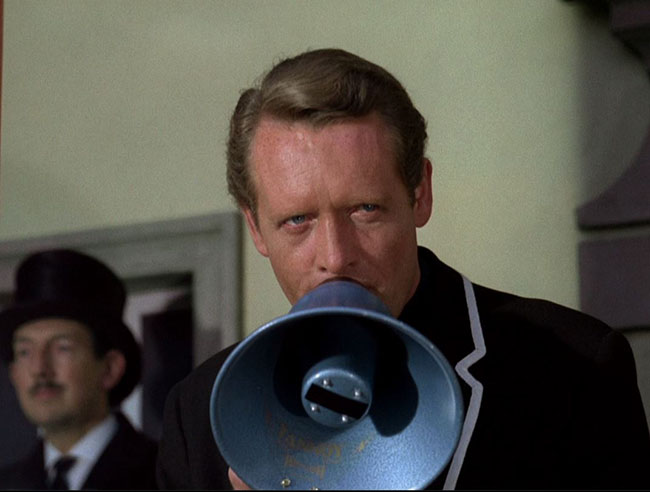
No.6 (Patrick McGoohan) announces his candidacy for No.2.
OBSERVATIONS
This and “Fall Out,” the finale, are the most overtly political episodes of The Prisoner. Not for nothing, they were both written by Patrick McGoohan (here under a pseudonym, “Paddy Fitz” – the Fitz taken from his mother’s maiden name of Fitzpatrick). The message is pretty clear: run for office and you get processed through the machine, losing your ideals until you’re just another politician. As soon as No.6 is brainwashed a third of the way through the episode, he begins making empty promises which the Villagers eat up. “Where do you desire to go? What has been your dream? I can supply it. Winter, spring, summer or fall, they can all be yours at any time. Apply to me and it will be easier and better.” When he chants, “For Free! For All! For Free! For All!” in typical McGoohan staccato, he is of course unaware of the irony: a free-for-all equates to mob rule.
But he also enforces the party line, demanding that the Villagers give up their information: “There is only one thing to learn and it can be learned very quickly. Obey the rules and we will take good care of you.” He becomes No.2 very quickly thanks to the brainwashing of No.20, who – on a screen projected behind them – funnels a sphere and a square, representing truth and lies, into No.6’s silhouette. No.6 is conquered when the two shapes are joined with his head, a visual representation of Orwellian doublethink: the ability to hold in one’s mind two contradictory notions. To subvert the individual’s understanding of truth is one of the principal weapons of an authoritarian dictatorship.
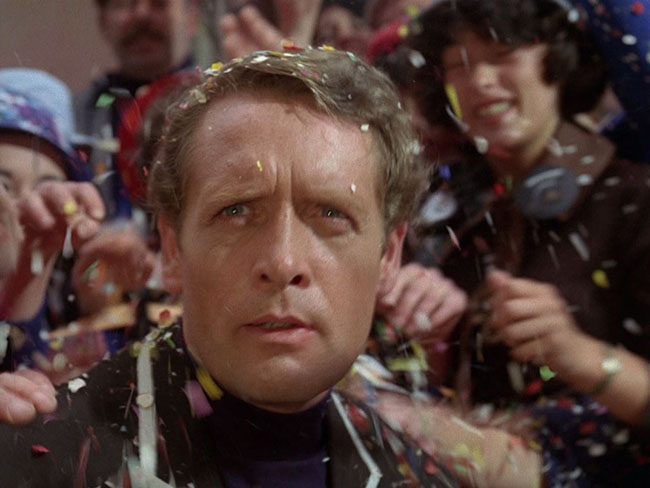
The chaos of a campaign rally.
If all this sounds impossibly dark, well, it is – but there’s plenty of satirical comedy to alleviate the grimness. When No.6 is interviewed by a reporter (No.113) and his photographer (No.113B), it’s a mini-sketch straight out of Duck Soup:
No.113: How will you handle your campaign?
No.6: No comment.
No.113 (writing): “Intends to fight for freedom at all costs.” How about your internal policy?
No.6: No comment.
No.113: “Will tighten up on Village security.” What about your external policy?
No.6: No comment.
No.113: “Our exports will operate in every corner of the globe.” How do you feel about life and death?
No.6: Mind your own business.
No.113: “No comment.”
This may be as much a personal as a political comment given McGoohan’s feelings about giving interviews. He gave very few during his lifetime; and, as one example, he edited his own interview with Alain Carrazé printed in the 1989 book Le Prisonnier, thus ensuring his words were not misrepresented.
“Free for All” speaks to the counterculture’s distrust of their elected representatives, viewing them as cogs in the machine incapable of implementing real change. McGoohan’s view of elections can best be summarized by the Villagers’ humorously inane chants of “6 for 2! 6 for 2!” The candidates might change, but they’re just arbitrary numbers; it is the system itself which must be remade through revolution (which leads to “Fall Out”). Personally, I lean more toward the “our candidates and elected officials really do matter” camp, but “Free for All” is undoubtedly a compelling portrait of how democracies can be corrupted by their own soulless machinery.
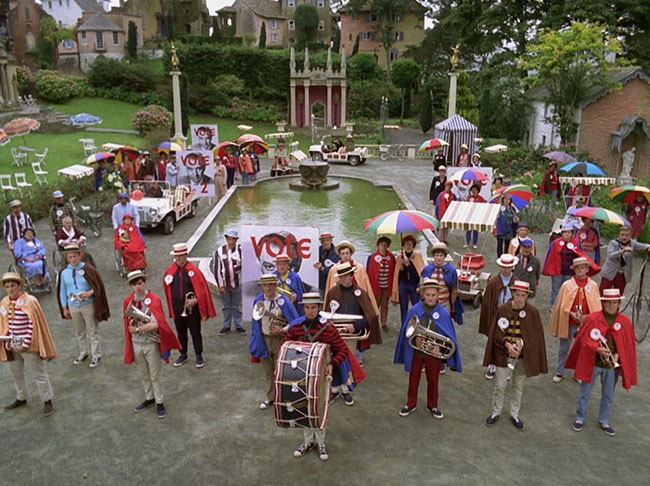
The Villagers rally for No.2.
VILLAGERS
Alongside “Arrival” and “Checkmate,” “Free for All” makes excellent use of Portmeirion and the locals hired as extras – you can see the fun they’re having marching through the avenues holding their “Vote No.2” or “Vote for No.6” placards. So for those who enjoy the Portmeirion aspect of The Prisoner, this episode is particularly special.
Nonetheless, the Villagers, as portrayed in “Free for All,” are as grotesque a mob as they will ever appear in the series. At least in “Arrival” we had glimpses of them as individuals: the Admiral always looking for a chess partner; the terrified maid; the woman who reports to No.2 while secretly plotting her own escape, grieving at the apparent suicide of her friend. In this McGoohan-scripted installment, they are a frightening crowd that acts thoughtlessly. They endorse candidates like following the latest fad. The reporters – one of whom is designated 113, the other 113B, as though they constitute a single person! – compose their own interview, ignoring No.6’s input. They’re satirical devices, not individuals. When the Villagers withhold their applause at No.6’s coronation with an indifferent silence, it’s shocking and, in its own way, just as violent as their adoration in earlier scenes. They seem to act according to the Village’s will, as though the Village were a giant computer and they are only component parts. It could be argued that McGoohan violates the premise that the Village is a holding cell for former spies; these Villagers don’t act like former anything, regardless of lobotomies or brainwashing at the Hospital. But as the series progresses – and, in particular, as it concludes – it becomes clear that McGoohan sees the Villagers as something toward which No.6 must react. No.6 is the individual, not the Villagers. In future episodes we will see many examples of Villagers who are just as much victims as No.6 is, but the ones written by McGoohan follow a line he gave in an interview with Warner Troyer in 1977 (italics mine): “Ah, the majority of them have been sort of brainwashed. Their souls have been brainwashed out of them. Watching too many commercials is what happened to them.”
The Villagers in “Free for All” serve the episode’s larger satirical theme and follow a dream-like logic. This hour, like others to come, can in some ways be treated as a stand-alone, cutting many ties to other episodes. What it does accomplish is a complete immersion into hallucinogenic paranoia, Alice in Wonderland as a political nightmare.
I forgot to mention in my “Arrival” review that some Villagers have negative-image badges: black with a white penny-farthing. “Free for All” again shows examples of this, which is left unexplained, but perhaps reinforces the black-and-white chess motif of the series.
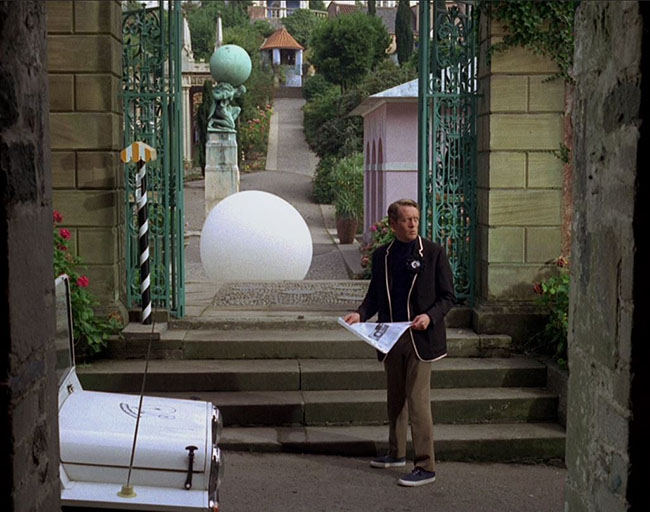
No.6 reads the Tally Ho.
THE VILLAGE
Further dream-like elements of the Village in this episode: after No.6 addresses No.2 on the phone, No.2 appears at his door in seconds; after No.6 announces he will run for office, placards stating “Vote for No.6” are produced at once by a cheering crowd (though this could just be part of No.2’s plot); after No.6 gives his “no comment” interview, the printed version is shown to already be available at a newsstand (though the reporter never listened to anything No.6 said anyway).
SEQUENCE
One could easily slate “Checkmate” or “Dance of the Dead” in as the second episode; the episode which aired second in the U.K. These episodes reference the fact that No.6 has only recently arrived in the Village. So why “Free for All”? Honestly, for a while I resisted placing this order second because it seemed unreasonable that No.6 would run for office when he’s only just arrived. Wouldn’t he try to escape first (as in “Checkmate”) before he tries to destroy the Village from within? But in looking more closely at this episode over the years, it really seems to me that McGoohan intended this to be No.6’s first major incident during his stay. On a superficial level, the call sheets and scripts refer to this as “Episode 2” (it was second in production order). On an even more superficial level – or a numerological one – it seems fitting that Episode 2 is all about becoming No.2. But as No.2 tells No.6 at the very end of “Free for All,” “This is only the beginning. We have many ways and means, but we don’t wish to damage you permanently.” It is possible to take her statement literally, that they have only just begun to work on No.6.
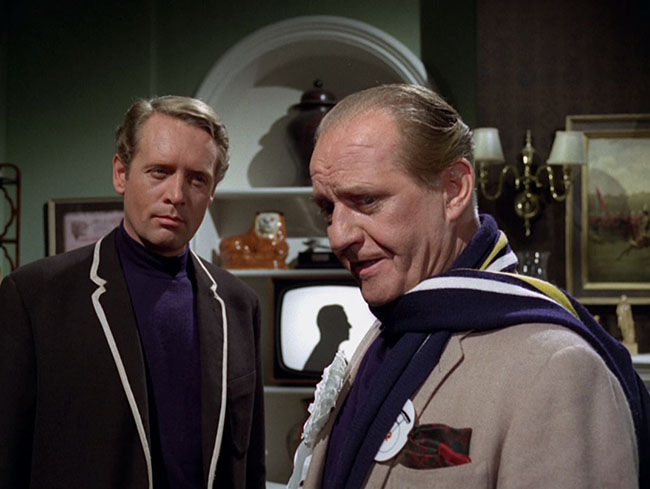
No.2 (Eric Portman) explains the Village elections.
Consider that No.6 is not asked why he resigned. As with “Arrival” (in which the question is only casually asked, like an afterthought), it is less about learning No.6’s secrets than proving a point. In “Arrival,” the point was that he can’t escape. In “Free for All,” the point is more critical to the meaning of the show: his individuality cannot withstand the Village. No.2 – the real No.2, the one who has been in disguise all along – has orchestrated a manner to break down No.6’s will and erode his beloved principles. The cruelty of the final scene is that No.2 demonstrates she has already broken him, and this is only “the beginning.” In fact, No.6 does not spend much of the episode as himself. Very soon after agreeing to run against No.2, he’s molded by force into the candidate the Village wishes him to be. One wonders why No.20 doesn’t ask No.6 why he resigned when he’s got him hooked up to his quasi-lie detector. In fact, he’s not interested, because that’s not the goal. It is merely to show him that he can be brainwashed.
Why does No.6 succumb so quickly? In episodes like “A. B. & C.” he demonstrates an ability to resist mental manipulation. You could say he’s taken off guard, not realizing just how extraordinarily the Village will act. In a way, this episode features a naïve No.6 – he must be very new to the Village.
One could also ask why the Village has annual elections since the various No.2’s change at a rapid rate. If this is the second episode of the series, it’s more reasonable to conclude that No.6 doesn’t know this yet. It’s possible there have never been elections in the Village before, and this, too, is part of the con enacted on No.6. If this episode were placed any later, it would seem even more improbable that No.6 wouldn’t question the absurdity of having an election. (Of course, the fact that there’s an election at all in a place like the Village is the main joke of the episode.)
But there’s another reason to place this episode second. It’s one of the best episodes of the show. It’s also one of the most iconic, with its black and white “Vote for No.6” signs waving in the air. And, yes, it’s one of the most challenging and surreal, but that only sets expectations for the two-part finale. This is The Prisoner, through and through. Now that the table setting of “Arrival” is over, we dive into the deep end. Like No.6 at the end of this episode, we can pick up the pieces and say “What just happened?” – while No.2 smiles cruelly. We have a measure of the enemy, and escape attempts seem that much more formidable. In No.6’s election speech, he claims he will seek out “who are the prisoners and who are the warders.” With the next episode, he will set out on that very task.
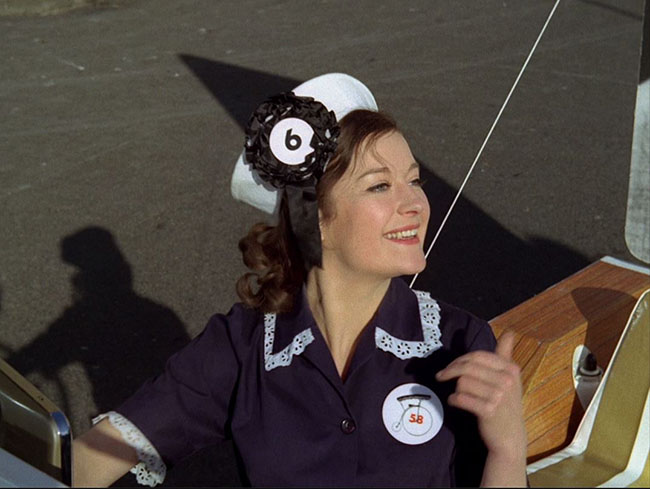
Rachel Herbert as No.58.
THE WARDERS
The opening credits summarize “Arrival” with re-written dialogue between No.6 and “The New No.2.” McGoohan now announces, famously, “I am not a number, I am a free man!” Also worth noting: “Who is No.1?” is only answered with “You are No.6.”
“The New No.2” in this case is the distinguished actor Eric Portman, who passed away just a few years later, in 1969. Note that when he speaks to No.6 before the Election Council, behind him is a pyramid with a blue flashing eye in the top, an Illuminati symbol. His best scene comes in the speakeasy, when he confides to No.6, “To hell with the Village. Cheers.” A few moments later, he drugs No.6 and promptly sheds his ragged cloak, an old bitter man no more. It’s a performance within a performance, just like the one given by Rachel Herbert as No.58/No.2. Herbert is extraordinary, delivering a nonsensical foreign language for the entire episode with a mad grin, aping the “Be Seeing You” gesture and continuing the Lewis Carroll feel of “Free for All,” before turning the tables on No.6 in the climax. Each time I watch her abruptly drop her smile and stare hatefully at No.6, a chill runs down my spine. Her slaps and “Tik! Tik!” taunts carry infinitely more weight than the standard episode fistfights. Why didn’t McGoohan bring her back for the series finale?
At the end of the episode, No.2 says “Give my regards to the homeland,” implying that the Village is either run from a non-Western entity or is global. This shifts the perception, from “Arrival,” that it’s a British enterprise.
BE SEEING YOU
“Be seeing you” is the Village parting phrase, accompanied by an “OK” gesture at the eye, emphasizing that you are being watched. Friendly and ominous at the same time, it’s another of The Prisoner’s nods toward 1984‘s Big Brother. In the documentary Don’t Knock Yourself Out, it’s speculated that McGoohan took both phrase and gesture from the film The Spider and the Fly (1949), which stars Eric Portman…this episode’s No.2.
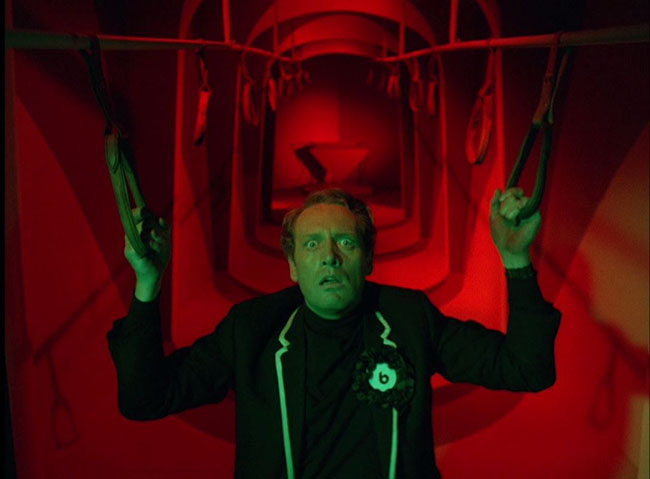
The Prisoner took dazzling advantage of shooting in color, for those at home with color TVs.
ROVER
Some curious additions to the already bizarre mythology of Rover: after he’s been captured off shore, we see No.6 floating in some kind of Rover holding chamber with other Rovers (the production had plenty on hand, since they burst all the time). Later, in some cavernous room just off the Green Dome’s main chamber, men wearing sunglasses sit in a circle facing a Rover. Are they studying it? Training it? Raising it? Worshiping it? Who knows – we never see anything like this again.
WIN OR LOSE?
This is the biggest loss for No.6 during the entire series, which is why it’s appropriate to view it so early in the run. In future episodes, he may lose the battle, but he retains a strong sense of identity.
FISTICUFFS
Two examples here, since it’s such an intellectual episode and audiences need their action: No.6 steals a boat and fights its owners on the open sea, and later he battles security in a secret hallway in the Green Dome.
PROPAGANDA
No.2 says, “Humor is the very essence of a democratic society,” which is a paraphrase of one of the Labour Exchange signs from the previous episode.
The Butler holds up a sign to prompt the Villagers: “Ra Ra Ra.” Also, “Progress Progress Progress.” As previously stated, progress is a theme in The Prisoner as represented by the penny-farthing bicycle. In the Troyer interview, McGoohan elaborated on his feelings:
I think progress is the biggest enemy on earth, apart from oneself, and that goes with oneself, a two-handed pair with oneself and progress. I think we’re gonna take good care of this planet shortly. They’re making bigger and better bombs, faster planes, and all this stuff one day, I hate to say it, there’s never been a weapon created yet on the face of the Earth that hadn’t been used and that thing is gonna be used unless…I don’t know how we’re gonna stop it, now it’s too late, I think.
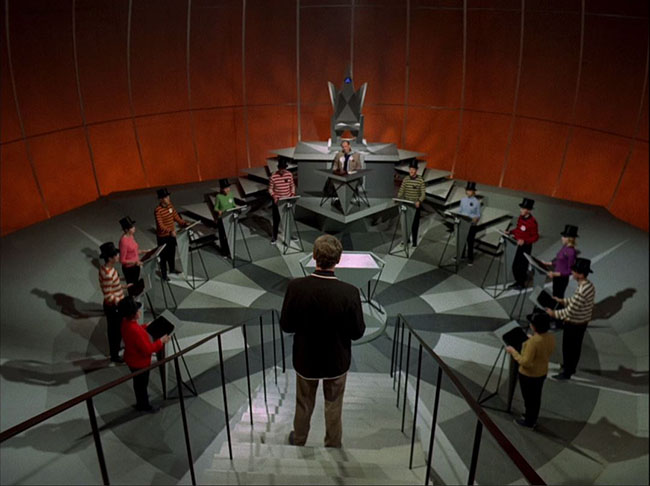
The Council. Note the pyramid with its one eye behind No.2.
QUOTES
No.2: [on the phone] Any complaints?
No.6: Yes. I’d like to mind my own business.
No.2: So do we. Do you fancy a chat?
No.6: The mountain can come to Mahomet!
[No.2 steps through the door]
No.2: Mahomet?
No.6: Everest, I presume.
No.2: I’ve never had a head for heights.
No.6: How’s No.1?
No.2: At the summit.
No.2: Are you going to run?
No.6: Like blazes, the first chance I get.
No.6: I am not a number. I am a person.
Crowd: [laughter]
No.6: In some place, at some time, all of you held positions of a secret nature, and had knowledge that was invaluable to an enemy. Like me, you are here to have that knowledge protected or extracted.
No.2: That’s the stuff to give them.
No.6: Unlike me, many of you have accepted the situation of your imprisonment and will die here like rotten cabbages.
No.2: Keep going. They love it.
No.6: The rest of you have gone over to the side of our keepers. Which is which? How many of each? Who’s standing beside you now? I intend to discover who are the prisoners and who are the warders. I shall be running for office in this election.
No.6: Less work. And more pay!
UP NEXT: CHECKMATE
